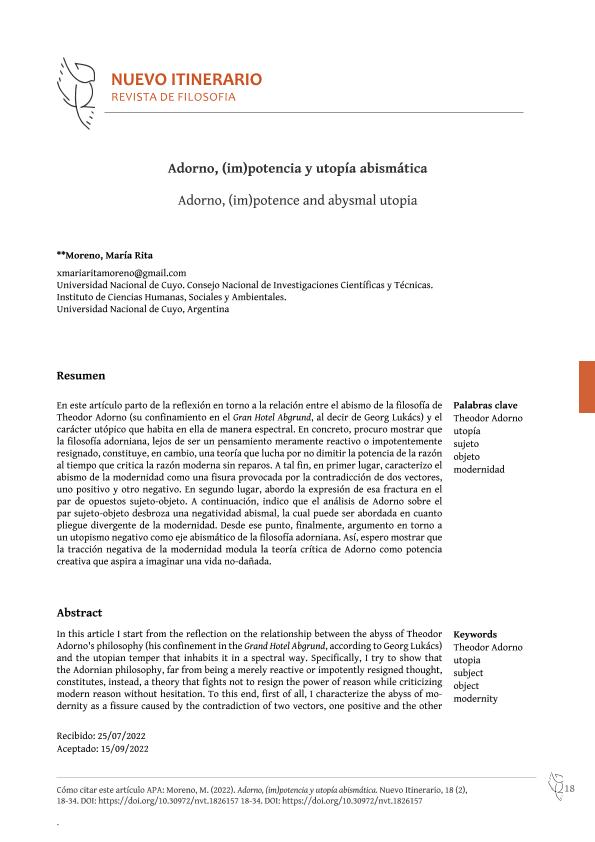Mostrar el registro sencillo del ítem
dc.contributor.author
Moreno, María Rita

dc.date.available
2023-07-10T19:10:54Z
dc.date.issued
2022-11
dc.identifier.citation
Moreno, María Rita; Adorno, (im)potencia y utopía abismática; Universidad Nacional del Nordeste; Nuevo Itinerario; 18; 2; 11-2022; 18-34
dc.identifier.uri
http://hdl.handle.net/11336/203082
dc.description.abstract
En este artículo parto de la reflexión en torno a la relación entre el abismo de la filosofía de Theodor Adorno (su confinamiento en el Gran Hotel Abgrund, al decir de Georg Lukács) y el carácter utópico que habita en ella de manera espectral. En concreto, procuro mostrar que la filosofía adorniana, lejos de ser un pensamiento meramente reactivo o impotentemente resignado, constituye, en cambio, una teoría que lucha por no dimitir la potencia de la razón al tiempo que critica la razón moderna sin reparos. A tal fin, en primer lugar, caracterizo el abismo de la modernidad como una fisura provocada por la contradicción de dos vectores, uno positivo y otro negativo. En segundo lugar, abordo la expresión de esa fractura en el par de opuestos sujeto-objeto. A continuación, indico que el análisis de Adorno sobre el par sujeto-objeto desbroza una negatividad abismal, la cual puede ser abordada en cuanto pliegue divergente de la modernidad. Desde ese punto, finalmente, argumento en torno a un utopismo negativo como eje abismático de la filosofía adorniana. Así, espero mostrar que la tracción negativa de la modernidad modula la teoría crítica de Adorno como potencia creativa que aspira a imaginar una vida no-dañada.
dc.description.abstract
In this article I start from the reflection on the relationship between the abyss of Theodor Adorno's philosophy (his confinement in the Grand Hotel Abgrund, according to Georg Lukács) and the utopian temper that inhabits it in a spectral way. Specifically, I try to show that the Adornian philosophy, far from being a merely reactive or impotently resigned thought, constitutes, instead, a theory that fights not to resign the power of reason while criticizing modern reason without hesitation. To this end, first of all, I characterize the abyss of modernity as a fissure caused by the contradiction of two vectors, one positive and the other negative. Secondly, I address the expression of that fracture in the pair of opposites subject-object. Next, I indicate that Adorno's analysis of the subject-object pair uncovers an abysmal negativity, which can be approached as a divergent fold of modernity. From that point, finally, I argue around a negative utopianism as the abysmal axis of Adornian philosophy. Thus, I hope to show that the negative pull of modernity modulates Adorno's critical theory as a creative power that aspires to imagine an undamaged life.
dc.format
application/pdf
dc.language.iso
spa
dc.publisher
Universidad Nacional del Nordeste
dc.rights
info:eu-repo/semantics/openAccess
dc.rights.uri
https://creativecommons.org/licenses/by-nc/2.5/ar/
dc.subject
THEODOR ADORNO
dc.subject
UTOPÍA
dc.subject
MODERNIDAD
dc.subject
SUJETO-OBJETO
dc.subject.classification
Filosofía, Historia y Filosofía de la Ciencia y la Tecnología

dc.subject.classification
Filosofía, Ética y Religión

dc.subject.classification
HUMANIDADES

dc.title
Adorno, (im)potencia y utopía abismática
dc.title
Adorno, (im)potence and abysmal utopia
dc.type
info:eu-repo/semantics/article
dc.type
info:ar-repo/semantics/artículo
dc.type
info:eu-repo/semantics/publishedVersion
dc.date.updated
2023-07-06T12:33:26Z
dc.identifier.eissn
1850-3578
dc.journal.volume
18
dc.journal.number
2
dc.journal.pagination
18-34
dc.journal.pais
Argentina

dc.journal.ciudad
Chaco
dc.description.fil
Fil: Moreno, María Rita. Consejo Nacional de Investigaciones Científicas y Técnicas. Centro Científico Tecnológico Conicet - Mendoza. Instituto de Ciencias Humanas, Sociales y Ambientales; Argentina
dc.journal.title
Nuevo Itinerario
dc.relation.alternativeid
info:eu-repo/semantics/altIdentifier/url/https://revistas.unne.edu.ar/index.php/nit/article/view/6157
dc.relation.alternativeid
info:eu-repo/semantics/altIdentifier/doi/http://dx.doi.org/10.30972/nvt.1826157
Archivos asociados
